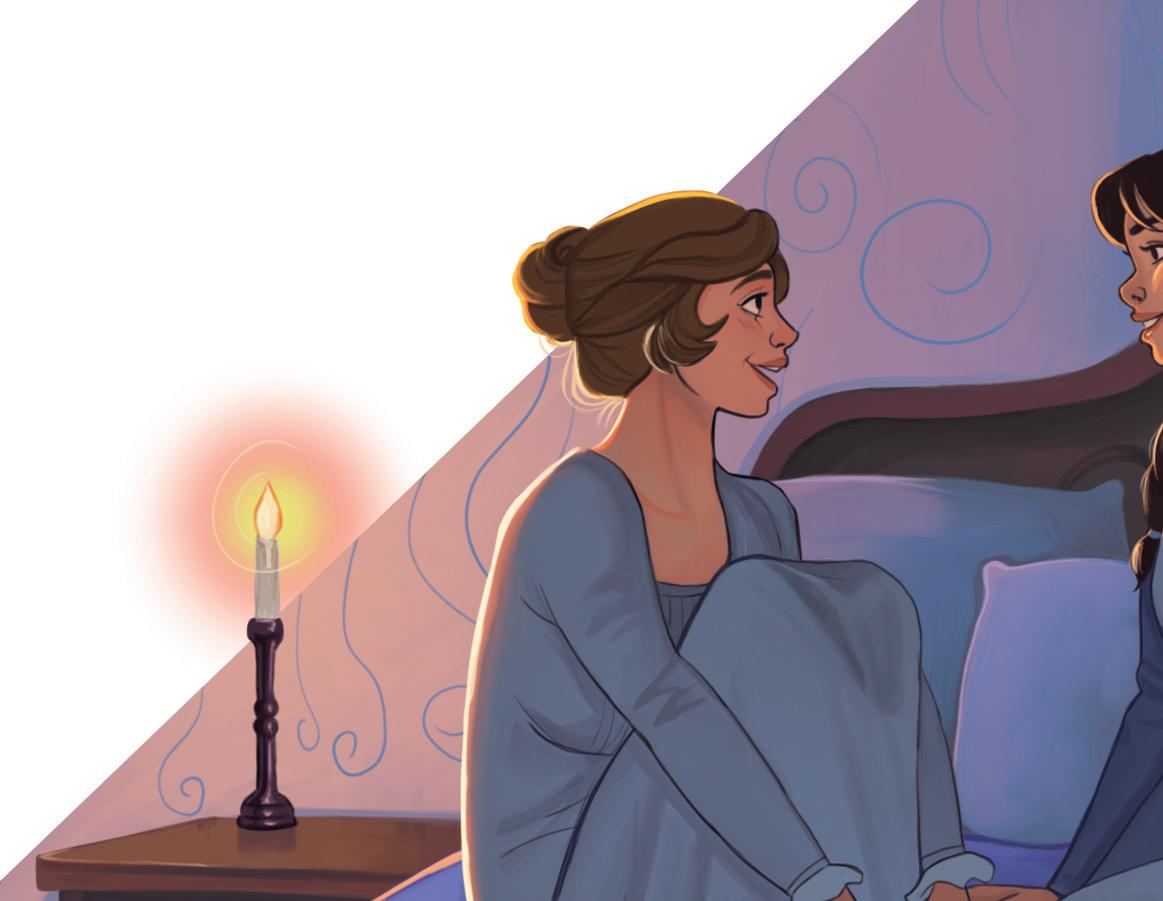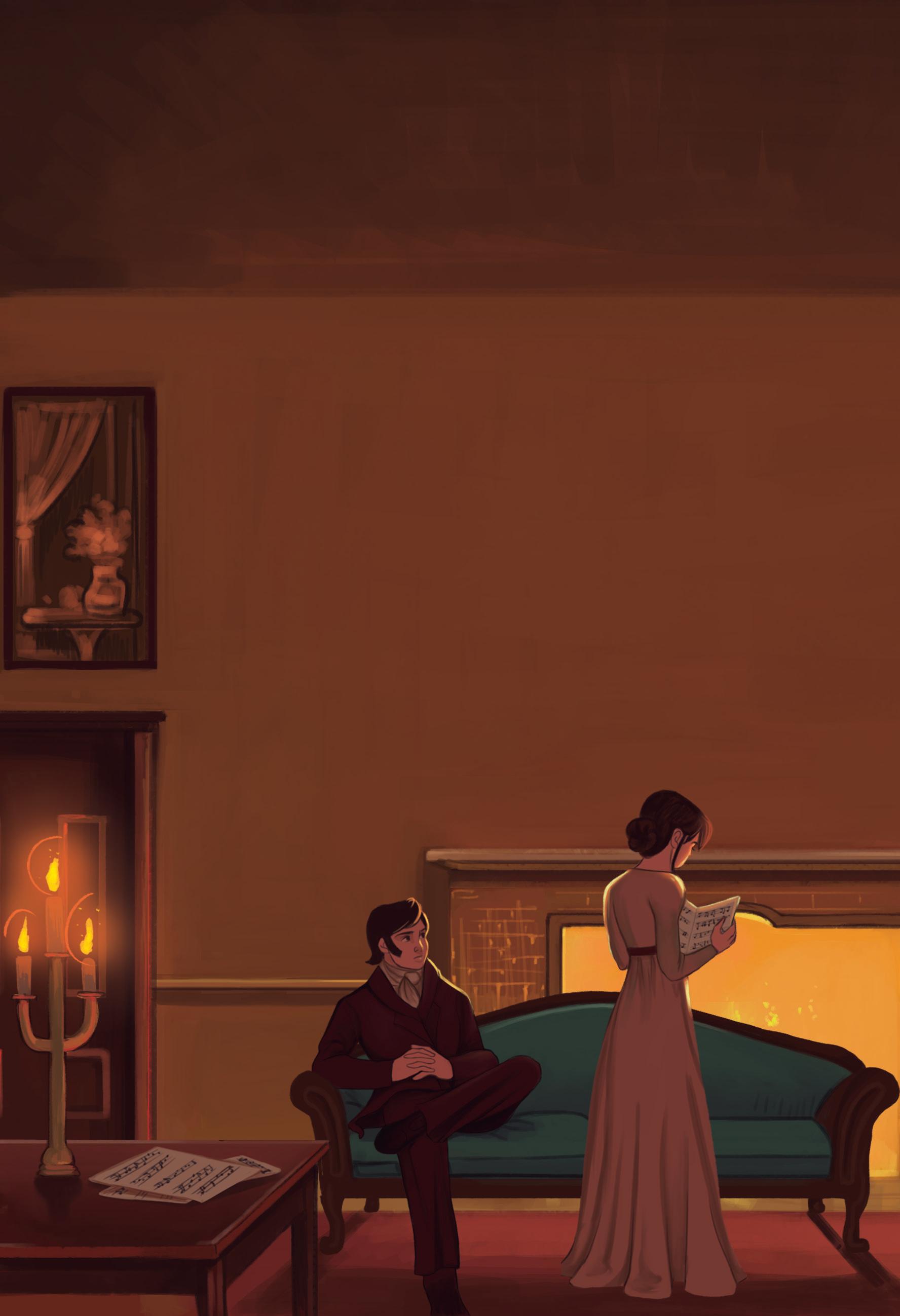














© 2018 – StandFor
Editorial Director Antonio Rios
Editorial Manager Cayube Galas
Editorial Coordinator Ana Carolina Costa Lopes, Renata Lara de Moraes
Series Editor Nick Bullard
Editorial Assistant Nathalia Thomaz
Contributor Fernanda Valezini Ferreira
Production Manager Mariana Milani
Production Coordinator Marcelo Henrique Ferreira Fontes
Proofreader Hannah Fish
Art Manager Ricardo Borges
Art Coordinator Daniela Di Creddo Máximo Design Yan Comunicação
Cover Design Yan Comunicação
Art Supervisor Patrícia De Michelis
Art Editors/Layout Anderson Sunakozawa, Lidiani Minoda
Illustrations Coordinator Márcia Berne
Illustrations Caroline Garcia
Operations Director and Reginaldo Soares Damasceno
Print Production Manager
Dados Internacionais de Catalogação na Publicação (CIP) (Câmara Brasileira do Livro, SP, Brasil)
Austen, Jane, 1775-1817.
Pride and prejudice : standfor graded readers, level 5 / Jane Austen ; retold by Brigit Viney ; illustrated by Caroline Garcia. -- 1. ed. -São Paulo : FTD, 2018.
ISBN 978-85-96-01505-9 (aluno)
ISBN 978-85-96-01506-6 (professor)
18-13961 CDD-028.5
Índices para catálogo sistemático:
1. Literatura infantil em inglês 028.5
2. Literatura infantojuvenil em inglês 028.5
All rights reserved. No part of this publication may be reproduced, stored in a retrieval system, or transmitted, in any form or by any means, electronic, mechanical, photocopying, recording, or otherwise, without the prior written permission of StandFor.
This book is sold subject to the condition that it shall not, by way of trade or otherwise, be lent, resold, hired out, or otherwise circulated without the publisher’s prior consent in any form of binding or cover than that in which it is published and without a similar condition being imposed on the subsequent purchaser.
Literatura infantojuvenil em inglês I. Viney, Brigit. II. Título. Avenida
Rua Rui Barbosa, 156 – Bela Vista – São Paulo-SP – Brasil – CEP 01326-010
Phone 0800 772 2300 – Caixa Postal 65149 – CEP 01390-970 – www.standfor.com.br
Produção
Jane Austen was born in Hampshire, England, in 1775. Her family was comfortable, but not rich; her father was a vicar and schoolteacher. Jane was educated at home and at a number of boarding schools.
The Austen family was a close and happy one, and the children were encouraged to write and put on plays. Jane’s stories were written first for her own family, but soon the manuscripts were read more widely, and her first novel, Sense and Sensibility, was published in 1811, followed by Pride and Prejudice in 1813. Her first novels were successful, and she went on to publish four more.
Jane Austen never married, and lived all her life in or near Hampshire. She died there in 1817.
Look at the picture on the front of the book and read the back cover. Check the correct answers.
1. Which century are these people living in?
a. the twentieth
b. the nineteenth ü
c. the eighteenth
d. the seventeenth
2. The story is about ...
a. the adventures of a young man.
b. a young man who disappears.
c. the love between a man and a woman. ü
d. a young woman’s search for her father.
3. In the story ...
a. Elizabeth Bennet and Mr. Darcy like each other immediately.
b. Mr. Darcy has known the Bennets for a long time.
c. Elizabeth Bennet goes to work for Mr. Darcy’s family.
d. Mr. Darcy is much richer than the Bennets. ü
Check the things that you think are in the story. a rich gentleman ü
Elizabeth Bennet’s parents ü
a voyage to America an accident
a rich aunt ü some very poor people
some walks in the country ü
a doctor
some soldiers ü
three brothers
a long letter from Mr. Darcy ü
a bad storm
“My dear Mr. Bennet,” his wife said to him one day, “have you heard that somebody is going to live in Netherfield Park at last?”
Mr. Bennet replied that he had not.
“Well, a rich young man is going to live there, and his servants are coming next week. His name is Mr. Bingley, he is single, and he makes four or five thousand pounds a year. What a fine thing it is for our girls. He may marry one of them!”
“Is that his reason for coming here?” asked Mr. Bennet.
“Of course not! But he may fall in love with one of them, and so you must visit him as soon as he comes. We cannot visit him if you do not.”
“I will just send him a note to say he can marry which one he chooses, and that he may like Elizabeth the best.”
“Please do not!” replied Mrs. Bennet. She did not realize that her husband was teasing her, although they had been married for twenty-three years.
In fact, Mr. Bennet was one of the first gentlemen of the neighborhood to visit Mr. Bingley. When he told Mrs. Bennet this, she was very happy. “What an excellent father you have, girls!” she said.
A few days later, Mr. Bingley visited Mr. Bennet and sat for about ten minutes with him in his library. He had hoped to
Pride and Prejudice

see the five young ladies, because he had heard they were beautiful, but he did not. The ladies were luckier because they saw him from an upstairs window and saw that he wore a fashionable blue coat.
About a week later, there was a ball in Meryton. Mrs. Bennet and her daughters – Jane, Elizabeth, Mary, Kitty, and Lydia – and all the families in the neighborhood went to it. Mr. Bingley also went, and took with him his two sisters, his older sister’s husband and another young man. Mr. Bingley was handsome and friendly, and his sisters were very fine and fashionable. His older sister’s husband, Mr. Hurst, and his friend, Mr. Darcy, were clearly gentlemen. Mr. Darcy was tall, handsome, and very rich. A report soon went round the room that he made ten thousand a year. At first, everybody liked him, but then they found that he was very proud. He did not talk to them or dance with them. Mrs. Bennet disliked him very much because he had been unkind about one of her daughters. Elizabeth Bennet had had to sit down for two dances, because there were not enough gentlemen to dance with, and during that time Mr. Darcy stood near her. She heard Mr. Bingley talking to him.

“Darcy, you must dance,” said Mr. Bingley.
“I won’t. You know I hate dancing if I don’t know my partner. And you are dancing with the only beautiful girl in the room,” said Mr. Darcy, looking at Jane, the oldest Miss Bennet.
“Oh, she is the most beautiful girl I have ever seen! But one of her sisters is sitting behind you, and she is very pretty. Let me ask my partner to introduce you.”
“Who do you mean?” asked Mr. Darcy, and turned around. He looked for a moment at Elizabeth and then said coldly, “She is not pretty enough for me.”
Mr. Darcy and Mr. Bingley walked away, and Elizabeth did not feel very friendly towards Mr. Darcy. But she also thought that he had been silly, and told her friends about the conversation as a funny story.




At the end of the evening, Mrs. Bennet was happy because Mr. Bingley had danced twice with Jane and his sisters had spoken to her. The Bennets returned to Longbourn, the village they lived in, and Mrs. Bennet told her husband about the evening.
“Mr. Bingley is very handsome! But Mr. Darcy is very proud. I really dislike him.”
When Jane was alone with Elizabeth, she told her how much she liked Mr. Bingley.
“He is so pleasant and easy to talk to!” she said.
“He is also handsome, which a young man should be, if he can, and he is very nice,” said Elizabeth. “You have liked many others who were stupider.”





“Oh! You always like people and you think everybody is good. And so, do you like Mr. Bingley’s sisters? Their manners are not as good as his.”
“No, you are right. But when you talk to them, they are very pleasant. Miss Bingley is going to live here with her brother. I think she will be a very nice neighbor.”
Elizabeth did not say anything, but she did not agree. Mr. Bingley’s sisters were proud. They thought well of themselves and badly of others.
The morning after the ball, the Miss Bennets were visited by their neighbors, the Miss Lucases, so that they could discuss the ball.
The oldest Miss Lucas, Charlotte, was a close friend of Elizabeth’s.
“I heard Mr. Bingley tell somebody that Jane was the prettiest woman in the room,” said Charlotte.
”Well! That was very kind of him,” replied Mrs. Bennet. “But he may not do anything about it, you know.”
“I wish you had heard something better from Mr. Darcy, Elizabeth,” said Charlotte. “And I wish he had danced with you.”
“Another time, Elizabeth,” said her mother, “do not dance with him. He is so proud.”
“I can promise you I will never dance with him,” replied Elizabeth. “He is proud,” said Charlotte, “but that is not surprising. He is very rich, and he comes from a very good family.”
‘That is very true,” replied Elizabeth, “and I could easily forgive his pride, if he had not hurt mine.”

The ladies of Longbourn soon visited those of Netherfield, and their visit was returned. It was clear that Mr. Bingley liked Jane, and to Elizabeth it was clear that Jane liked him. Elizabeth was sure that nobody else knew how Jane felt because she was always pleasant and calm. She talked to Charlotte about this.
“But it is not always good for a woman to hide her feelings,” said Charlot te. “If she does, a man may not fall in love with her. Jane needs to show Bingley that she likes him.”
“They have only spent four evenings together, and she is not yet sure of her own feelings,” replied Elizabeth.
“Well,” said Charlotte. ‘If she married him tomorrow, she would have as much chance of happiness as if she studied him for twelve months. A man is always going to have faults, and it is better to know as little as possible about them before you marry him.”
“You make me laugh, Charlotte, but it is not true. And I know you would never act in this way yourself,” replied Elizabeth.
Elizabeth was so busy watching Jane and Mr. Bingley that she did not realize that Mr. Darcy had begun to think differently about her. He now thought that her beautiful dark eyes made her face unusually intelligent and that her figure was lovely. He also liked her easy playfulness.
At a large party at Sir William Lucas’s, he had a chance to speak to her when she was introduced to him.
“Mr. Darcy, allow me to introduce this young lady to you as an excellent dancing partner,” Sir William said. He took Elizabeth’s hand and was going to give it to Mr. Darcy, but Elizabeth, looking uncomfortable, said, ‘I do not plan to dance, sir.” Mr. Darcy then politely asked her to dance, but she refused with a smile, and walked away.
Miss Bingley came to talk to Mr. Darcy.
“You must be thinking how boring this party is,” she said.
“You are quite wrong. I was thinking about how lovely a pretty woman’s face can be when she has a pair of very fine eyes.”
“Who were you thinking of?”
“Miss Elizabeth Bennet,” replied Mr. Darcy.
“Miss Elizabeth Bennet!” repeated Miss Bingley. “I am very surprised! When must I congratulate you on your marriage? Your wife’s mother is lovely and of course she will often visit you at Pemberley.”
Mr. Darcy listened to her calmly, and said nothing, and so she continued to talk in this way for a long time.























Mrs. Bennet had a brother, who had a business in London, and a sister, Mrs. Philips, who lived in Meryton. Meryton was near Longbourn and the Miss Bennets walked there

several times a week to visit their aunt or the hat shop. The two youngest girls, Kitty and Lydia, went more often than Jane, Elizabeth, and Mary because they always wanted to get the latest news.
At that time, there was always plenty of news because a regiment had arrived in the neighborhood and was going to stay for the winter. Mr. Philips was a lawyer, and he visited all the officers, and this made Kitty and Lydia happier than they had ever been. The only thing they could talk about was officers.
One morning, while Lydia was telling her mother about two of the officers, a servant brought a note for Jane. She opened it and said, “Miss Bingley has asked me to have dinner with her and her sister while the gentlemen are having dinner with the officers.”
“Having dinner with the officers,” said Mrs. Bennet. “That is very unlucky.”
“Can I have the carriage, Mother?” said Jane.
“No, my dear, you must ride there. It will probably rain, and then you will have to stay the night.”
Jane left, and soon it began to rain. It rained all evening and Jane could not come home.
The next morning, Elizabeth received a note from Jane. She said that she had a sore throat and headache and could not return home. Elizabeth decided to go to see her.
She walked quickly to Netherfield. She had to cross many fields, and when she arrived, her dress was dirty, and her face was shining from the exercise. Everybody was surprised to see her and to learn that she had walked there. Jane had a fever and was in bed, so Miss Bingley invited Elizabeth to stay at Netherfield to look after her.
Elizabeth stayed with Jane all day. When Jane fell asleep, Elizabeth joined the others in the drawing-room. They were all playing cards and invited her to join them. She refused, but she sat near them and watched the game.
“I would like to see Miss Darcy again so much!” said Miss Bingley. “She is so lovely and plays the piano so well.”
“All young ladies can do so much!” said Mr. Bingley. “They all paint beautifully and play the piano.”
“Ladies should do more than that. They should sing, dance, draw, speak foreign languages, and have excellent manners,” said Miss Bingley.
“And they should read widely,” added Mr. Darcy. “I know only six women who do all these things.”
“I am surprised you know any!” said Elizabeth. Miss Bingley and Mrs. Hurst both began to describe women who could do all these things, but then Mr. Hurst told them to return to the card game. The conversation stopped, and Elizabeth soon returned to Jane.
The next morning Jane was still sick. Elizabeth was worried and asked her mother to come. Mrs. Bennet, Kitty, and Lydia reached Netherfield soon after breakfast. Mrs. Bennet saw that Jane was sick, but she did not want her to get better immediately. When she saw Mr. Bingley, she said, “She is too sick to leave. We must ask you to look after her a little longer.”
“Leave!” said Bingley. “We will not hear of it!”
“You are very kind, sir,” said Mrs. Bennet. “You have a lovely room here, Mr. Bingley. Netherfield is a beautiful place. I hope you won’t think of leaving it in a hurry.”
“I do everything in a hurry,” he replied. ‘If I decided to leave, I would go in five minutes.”
“That is just what I thought you would do,” said Elizabeth. “I did not know that you were a student of character. It must be an amusing study,” said Bingley.
“The country cannot offer you many people to study,” said Darcy. “But people themselves change so much that there is always something to study,” replied Elizabeth.
“Yes, a lot goes on in the country!” said Mrs. Bennet. She did not like Darcy’s way of talking about the country.
“Mr. Darcy only meant that there are not so many sorts of people in the country, which is true,” said Elizabeth, feeling embarrassed for her mother.
Mrs. Bennet thanked Mr. Bingley again and ordered her carriage. Lydia then came forward. She was a big girl of fifteen and a favorite with her mother. She was very sure of herself and was not frightened of speaking to Mr. Bingley. When he had first come to Netherfield he had promised to give a ball, and she asked him about it. He promised to give the ball when Jane was better.
Mrs. Bennet, Kitty, and Lydia then left, and Elizabeth returned to Jane. She spent the day with her and only joined the others in the evening. Darcy was writing a letter, and Miss Bingley kept talking to him. Elizabeth was amused by their conversation.
“You write so fast!”
“I write quite slowly.”
“You write so easily!”
“He does not!” said Bingley. “He is always trying to think of long words. Aren’t you, Darcy?”
“I write in a different way from you,” replied Darcy.
“I write very quickly,” said Bingley.
“You are proud of your quickness in writing, as you were proud this morning of your quickness in deciding things,” said Darcy. “But I am not sure you would leave here quickly. If a friend told you to stay, you would stay.”
“That is a good quality!” said Elizabeth. “Do you think it’s bad to do what a friend wishes?”
“It’s hard to say without knowing what the friend wishes,” replied Darcy.
“Oh!” said Bingley. “Let’s not talk about this any more. It is becoming an argument.”
“I agree,” said Elizabeth. “Mr. Darcy should finish his letter.”
Mr. Darcy took her advice and when he had finished, he asked the ladies for some music. Miss Bingley and Mrs. Hurst sang

together, and Elizabeth looked at some music books. She noticed that Mr. Darcy often looked at her. She thought that he could see something wrong in her, but she did not care. In fact, Darcy had never liked a woman so much before. He liked her sweetness and playfulness. “If her family were of a higher rank, I would be in some danger,” he thought.
The next day Jane was well enough to come down into the drawing-room after dinner. Mr. Bingley welcomed her warmly and spent half an hour building up the fire for her. Then he sat down next to her and talked to almost nobody else.
Mr. Hurst lay down on a sofa and went to sleep. Darcy and Miss Bingley began reading, and Mrs. Hurst sometimes joined in with Bingley’s conversation with Jane. Miss Bingley soon became bored with her book and began walking around the room. Her figure was good, and she walked well, but Darcy did not look up from his book.
“Will you join me, Elizabeth?” she asked. “It is very enjoyable to move after sitting so long in one place.”
Elizabeth was surprised, but agreed. Darcy looked up, and closed his book. Miss Bingley invited him to join them, but he refused.
“You want to walk together because you have secrets to discuss, or because you want to show us your figures,” he said.
“What a terrible thing to say!” said Miss Bingley.
“What shall we do?”

“Tease him, laugh at him,” said Elizabeth. ‘You must know how to do it.”
“I do not!” replied Miss Bingley. “And I cannot laugh at him!”
“I suppose he never does anything silly and has no faults,” said Elizabeth.
“I have enough faults,” said Darcy. “I know that I cannot forget what people do wrong. When people offend me, I do not forgive them.”
“That is a bad fault,” said Elizabeth. “I cannot laugh at it. You are safe from me.”
“Let us have some music,” said Miss Bingley. Mrs. Hurst began playing the piano, and Darcy was not sorry. He was beginning to feel the danger of speaking to Elizabeth too much.
The next day was Saturday, and Elizabeth and Jane asked Bingley if they could go home in his carriage. He asked them to stay one more day. Miss Bingley was happy that they were going because she disliked Elizabeth, and Darcy was happy because he liked her too much.
On Sunday, Jane and Elizabeth went home. Their mother did not welcome them very warmly, but their father was happy to see them. Mary was studying as usual, and Kitty and Lydia were talking about the officers.



loved by millions of readers.

Elizabeth Bennet is young, smart, and amusing. She and her four sisters have learned that a woman has to find a rich man to be happy, but Elizabeth also wants to find someone she can love. Who will she find? There’s Mr. Bingley, rich and charming; Mr. Wickham, an exciting and friendly soldier; Mr. Collins, a vicar with good prospects; and Mr. Darcy, enormously rich, but distant and proud. But will pride and prejudice separate Elizabeth from true love? Perhaps the greatest of Jane Austen’s novels, it has been


StandFor Graded Readers provide a range of engaging reading materials for learners of English. Carefully graded by level, the series includes retellings of great classics, and informative, factual titles.
380 Headwords
580 Headwords
800 Headwords
1000 Headwords
Level 5 | 1350 Headwords
















